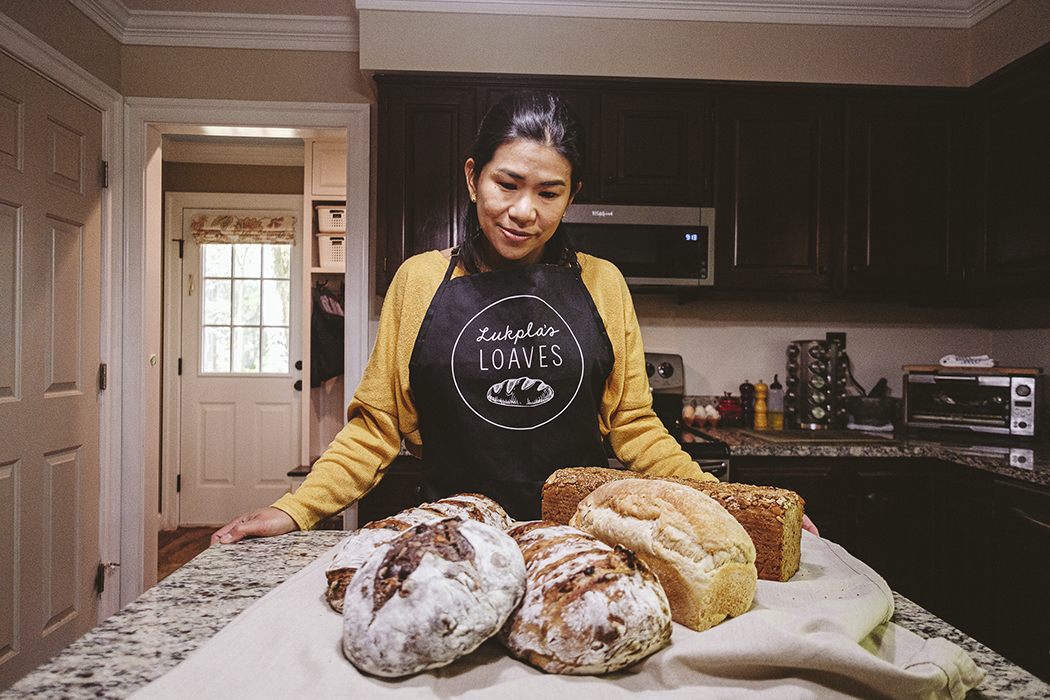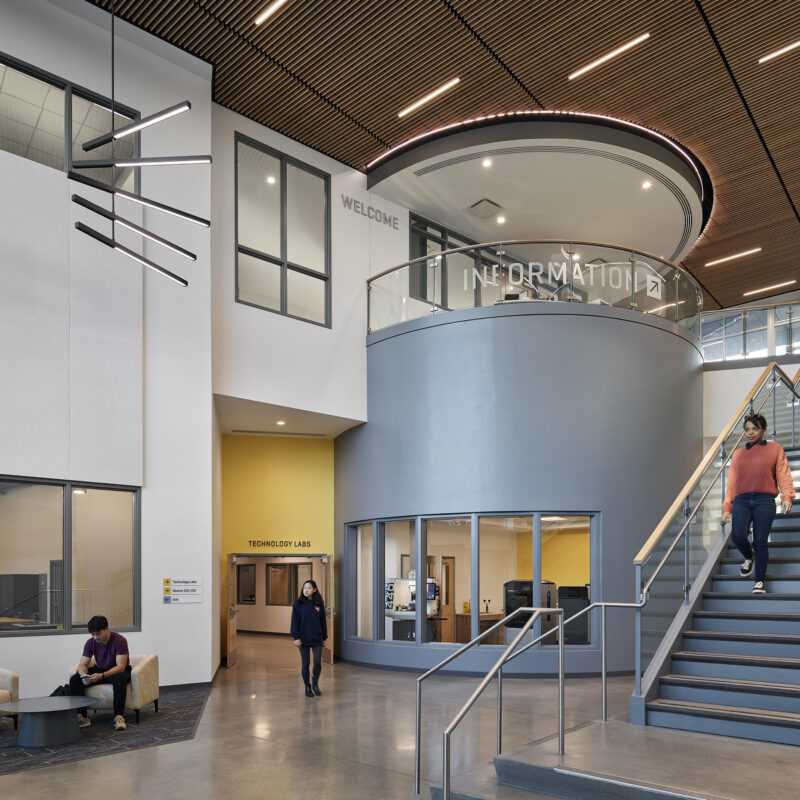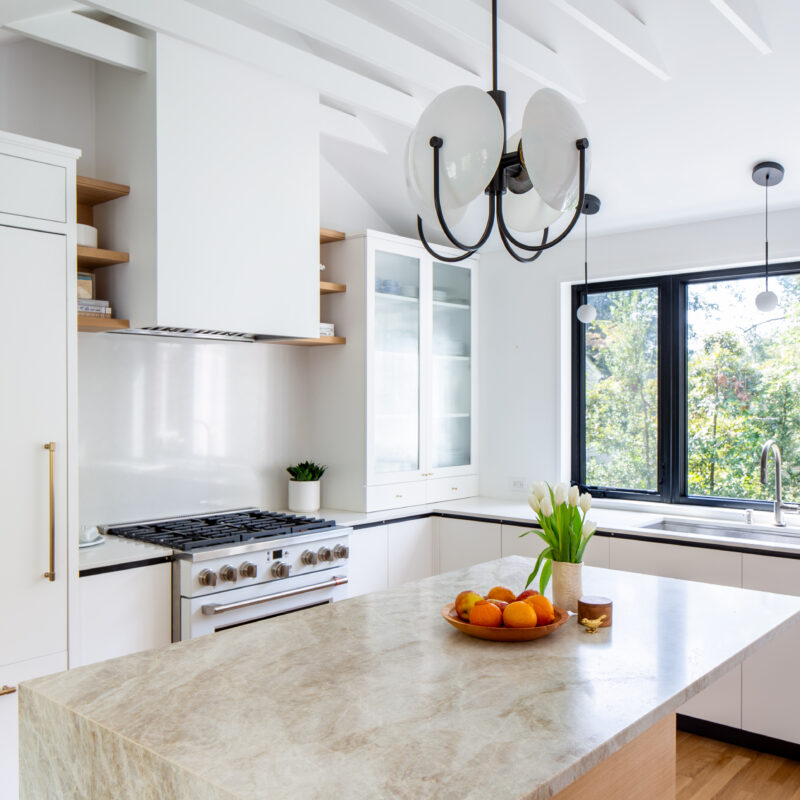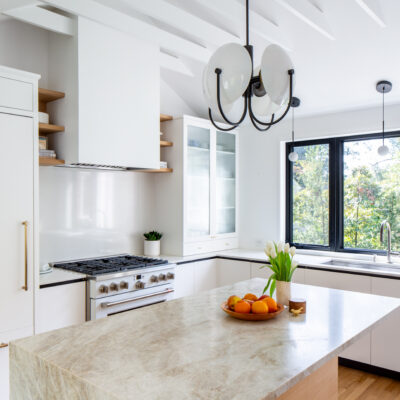How does anyone get better at anything? They practice. That’s what these three artisan bakers have in common—they found a thing they were interested in (bread), experimented with its execution (over and over and over), and became experts. We’re just lucky enough to reap the benefits.
Risen Bread
Truth be told, says Abbey Biber, “I never intended to start a company. My extended family and friends encouraged me to consider it.”
Biber had been baking bread for her family for about five years with, she says, “countless flops” and a few loaves that turned out well. It was the good ones that encouraged her to keep at it. Eventually, she started giving away the best loaves, and that was when the recipients urged her to start Risen Bread.
Biber prides herself on never using yeast (“flour, water, and salt—that’s it,” she says) and touts the benefits of sourdough over other types of bread.
“Bread that is fermented is easier to digest because the bacteria breaks down the gluten,” she says. “Sourdough bread is also less likely to spike your blood sugar, having a lower glycemic index compared to other breads due to the fermentation process. I also think the flavor of sourdough bread is more complex and delicious.”
Her menu includes signature products like a country loaf (“great for dipping in soup or oil, for sandwiches and toast”), and other staples like a rosemary loaf, focaccia, and pizza dough. And she’s always experimenting, having tried out a short run of cinnamon/raisin bread earlier this spring, and a sourdough naan that was a hit with her husband and two kids. Biber says a seeded loaf is the most likely addition to the menu this summer.
Naturally leavened bread makes for a lengthy baking process—more than 24 hours from start to finish—so Biber bakes twice a week, every Tuesday and Wednesday, and has weekly pickup locations in Greenwood and Charlottesville. Place your order through Instagram @risenbreadva.
Lukpla’s Loaves
Lukpla Gerbert had always loved reading food blogs and watching cooking videos. But after the birth of her son and daughter, twins, she began to spend a lot more time at home. Eventually, what was once a passing fascination with from-scratch cooking became a full-on hobby.
“I enjoyed cooking from scratch, including yeast bread with a bread machine,” she says. “From there I moved on to baking sourdough bread, doing as much as possible by hand.”
Each of the loaves, which she bakes once a month, are made with 100 percent sourdough starter, no yeast, and organic flour. Gerbert changes the menu each month, adding in new, fun options to her list of staples, like bestseller Chalapeño (cheddar and jalapeño) or sourdough pizza crust, which she can barely keep in stock.
Eventually, she says, she’d like to return to selling at the Forest Lakes Farmers Market, where she launched her business in 2019, but for now Gerbert takes orders online and makes deliveries monthly. The baker, who is a full-time stay-at-home mom to her now-kindergarteners, posts her monthly menu to the Lukpla’s Loaves’ Facebook and Instagram pages (@lukplasloaves). Send her your order, get a confirmation, pay online, and wait for your loaf to be delivered.
“Baking small batches of sourdough for neighbors is what I love,” she says. “I wouldn’t be able to bake if there were no customers to support me.”

Althea Bread
Marian Bayker was finishing a degree in biology at Mary Washington University when she fell in love with the service industry. “I always looked forward to my shifts at Hyperion Espresso more than the schoolwork,” she says. That’s where she met her partner, Susan, and they eventually moved to Charlottesville, where Bayker took a job as a UVA research lab tech, and began studying cancer immunology. Working in science was fascinating, she says, but she decided to stop avoiding the pull she felt toward service work, and took a job first at Mudhouse in Crozet, and then at MarieBette. It was there that she became fascinated with bread.
“Bread seems so simple, and in a lot of ways it is, but there is a lot of complexity hiding under the surface,” Bayker says. “What is flour really made of? How does it ferment? How can we adjust the bread-making process to get what we want in the final loaf?”
Eventually, she connected with a farmer who wanted to turn his wheat into bread, and Bayker began milling flour and baking bread at home using local grain.
That’s the heart of Althea (which, in Greek, means wholesome and healing) bread.
“I’ve always thought of Althea Bread as a mill first, bakery second,” Bayker says. “We go through a lot of effort to mill the majority of our flour ourselves from local, organic grains, and to blend grains and flours together to achieve the properties we desire in each product.”
Althea is “definitely headed toward a brick-and-mortar,” Bayker says, but in the meantime, visit altheabread.com for details on how and when to get your hands on a loaf. (Bayker recommends the classic country sourdough or the red corn grit. And grab a few chocolate chip cookies for the road.)






